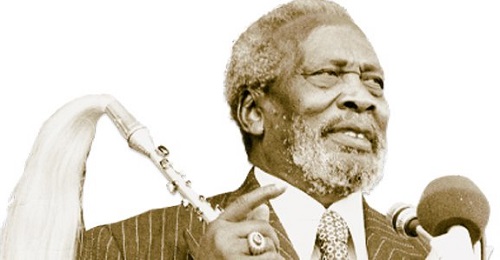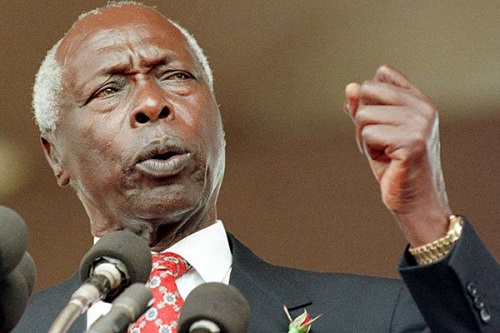African Socialism
African Socialism is a social-political system that has its roots in African values. It is based on ideologies that are drawn from African traditions. This philosophy incorporates foreign values and ideologies that were deemed useful.Origin of African Socialism
The KANU manifesto of 1963 borrowed heavily from existing indigenous African socialism.The ideas were published in Sessional Paper no. 10 of 1965 entitled "African Socialism and its application to planning in Kenya". This philosophy was coined by the Kenyan leader who intended to use it to achieve development in the nation.
Reasons why the Government Adopted African Socialism
- The leaders wanted to create a new society different from the colonial one.
- The leaders wanted to create a society free from social-economic inequalities, racism and oppression.
- The leaders desired to create a just and humane society in which all were considered equal before the law.
- The leaders desired to create a united and free Kenya where individual rights and freedoms would be recognized.
- To achieve high and growing income per capita.
Features of African Socialism
- Stresses on political democracy of free and equal people.
- Demands mutual social responsibility from all.
- Allows different forms of ownership including nationalization and private ownership.
- Demands that the state must ensure equal opportunities for all citizens.
- Advocates for progressive taxation where the wealthier pay more.
Effects of African Socialism
- Promotion of democratic processes. This has been realized for example through the establishment of a multi-party system of government
- Building of a society where human dignity is upheld and respected.
- It has promoted a sense of service and patriotism by upholding the policy of mutual responsibility.
- It has helped to promote African cultures.
- Agricultural development has been realized.
- It has promoted social development in Education and Health sectors.
Harambee Philosophy
Harambee is a Kenyan tradition of community self-help events, e.g. fund-raising or development activities.Harambee literally means "all pull together" in Swahili, and is the official motto of Kenya that appears on its coat of arms.
It was adopted by Mzee Jomo Kenyatta to pull the nation together after independence as a concept of building a new nation.
The system encouraged communities to work together to raise funds for all sorts of local projects, pledging that the government would provide their start-up costs.

Mzee Jomo Kenyatta, The Architect of Harambee Spirit
Principles of Harambee Spirit
- Harambee is a development strategy used for mobilization of the people locally to participate in social and economic development of their locale.
- Collective good, rather than personal gain, pushes the participation of people in harambee.
- It focuses on maximum utility of local resources like materials and labour.
- The felt needs of the majority ion society guide the choice of the project.
Harambee Movement Contribution to Development in Kenya
- The people of Kenya have been inculcated with the culture of hard work.
- Harambee funds have been used for infrastructural development like roads and water provision.
- Education growth through construction of schools and colleges, as well as paying school fees for children.
- Agricultural development has also gained from harambee through purchase of farming land and construction of cattle dips.
- It has helped promote national unity as people from different backgrounds come together to participate in harambee.
- Funds have been raised through Harambee to help the less fortunate members of the society.
- Harambee projects have attracted international attention where donors, especially NGO's, come in to help in such projects.
Harambee Movement Impact in Education Development
- Education institutions have been constructed through harambee, thus easing and enabling learning.
- Purchase of school furniture has been made possible through harambee, to help ease learning.
- Materials used in teaching and learning have been acquired through harambee, helping improve the quality of education.
- Support of co-curricular activities like music, drama and sports - helping in talent exploitation and nurturing.
- Assisting students to pay school fees has been done through harambees.
- Harambee contributions by parents have enabled in offsetting of inadequacy, hence improving service delivery in schools.
Challenges facing Harambee Movement
- Misuse and embezzlement of funds.
- Negative attitude from people in the face of corruption.
- Political interference from leadership and wrangles at the top.
- Use of the harambees to gain political mileage.
- Diversion of harambee funds to do things not intended in the first place.
- Poor coordination of the projects and equally poor supervision in implementation.
Nyayoism Philosophy
Originally, Nyayoism meant following in the footsteps of Mzee Jomo Kenyatta when President Moi took over the reis of power.However, it has changed to mean peace, love and unity as the pillars of the nation.
On the realization that nation building required love, President Moi emphasized on the Nyayoism philosophy.

Former President Moi - The Pioneer of Nyayoism
Pillars of Nyayoism
- Love: Love promotes togetherness and desire to work together for national development. Without love, peace is disturbed which creates disorder and destroys progress.
- Peace: A country free from war and disorder. Peace promotes development by discouraging political instability.
- Unity: This is harmony and agreement in objectives and feelings which is required in the diverse population in order to pursue nation-building.
Role of Nyayoism in National Development
- It has enabled the creation of a welfare state where everyone is mindful of other people's welfare.
- It has helped in unification of different communities through the unity call.
- It has helped in promotion of African cultures as it also borrows from African Socialism.
- It is a philosophy that can be identified as the basis of solving national development programs.
- The philosophy created respect for public property and functions.
Impact of National Philosophies
Social Impact
- Promotion of spiritual and social welfare of people by raising their living standards.
- There has been improvement in medical services
- Promotion of African cultures since the philosophies are derived from African traditions.
- Education has been promoted through philosophies like the Harambee.
- Through the Harambee spirit, the plight of persons with disabilities and other disadvantaged groups has been looked into.
Economic Impact
- Transport and communication has been improved through African socialism and Harambee spirit.
- Cooperative societies have been formed in agriculture and other sectors, thus contributing to the country’s development.
- The agricultural sector has been boosted by the philosophies hence boosting food production.
- The pillars of Nyayoism have created a conducive atmosphere for growth of tourism and foreign investment in the country.
Political Impact
- It has promoted international cooperation and understanding.
- African socialism has encouraged the democratization process as it champions for political equality.
- The philosophies have promoted nationalism and patriotism in the country.
